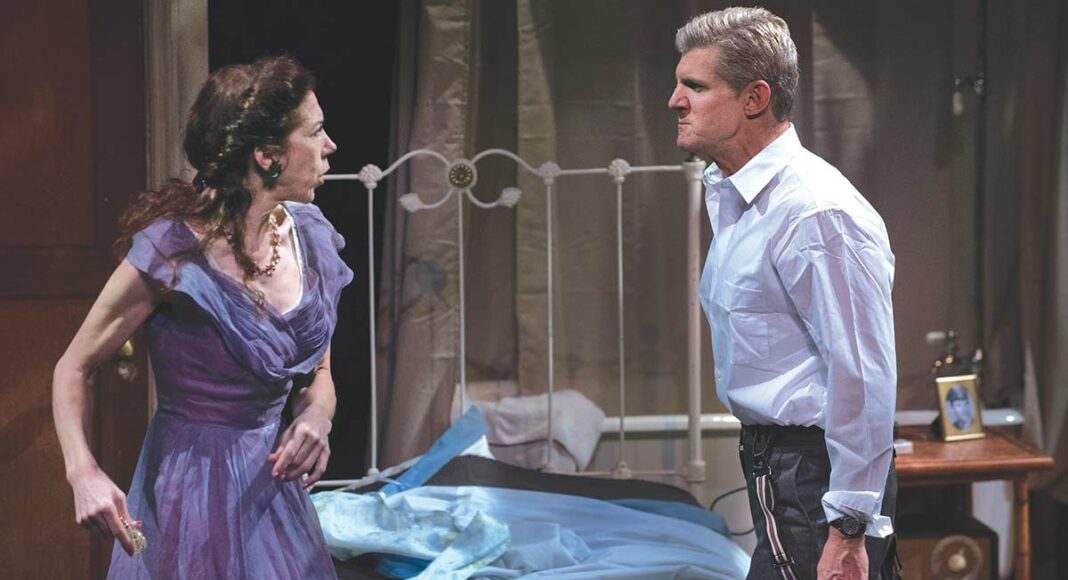These days, Tennessee Williams’ groundbreaking drama, A Streetcar Named Desire, could seem as quaint and mannered as the fading, delusional Southern belle at its center. But the old girl holds up surprisingly well in the smart new production of Streetcar that launches the twelfth season of Jewel Theatre Company.
First produced onstage in 1947, the play was controversial for daring to whisper (obliquely) about taboo subjects like homosexuality, sexual promiscuity, and rape. It examines the erosion of Southern gentility, in the hothouse flower that is Blanche DuBois, exposed in the merciless glare of the postwar modern world represented by her working-class brother-in-law, Stanley Kowalski. But Williams knew that the perceived elegance of the Old South—built on generations of slavery and repression—was as much an illusion as Blanche’s image of herself as a fragile innocent.
These are no longer considered scandalous, or particularly new ideas. But director Susan Myer Silton sets them up vividly in her JTC production. The story is set in the French Quarter of New Orleans, and one of Silton’s coolest innovations is to place a three-man jazz combo on a wrought-iron balcony overlooking the stage; they play the audience in, and the actors in and out of scenes, subtly punctuating the action, but never overwhelming it.
Stanley Kowalski (Brent Schindele), a factory foreman and ex-GI, lives in a two-room apartment with his wife, Stella (Erika Schindele). He downs beers, and plays poker with the boys, she gossips with the neighbors, and they enjoy a strong physical, if sometimes volatile, relationship.
But their marriage is strained when Stella’s older sister, Blanche (Julie James), arrives. A spinsterish onetime high school English teacher, Blanche spins a tale of woe about how the family home (a Mississippi plantation called Belle Reve), has been “lost,” as the elder generation died out. Alternately reproaching Stella for
“abandoning” the family that Blanche had to care for, and buttering her up as her “precious baby sister,” Blanche has nowhere to go, and her travel plans are indefinite.
Blanche deplores what she considers the Kowalski’s miserable living conditions, and finds Stanley crude and common. (James is extremely funny in Blanche’s speech on how “ape-like” Stanley is, even as the dramatic tension builds.) Stanley suspects her of cheating Stella out of the family inheritance; he loathes her superior attitude, her interference in his marriage, and her pretense to gentility, which he considers a phony act.
The clash of wills between them intensifies when one of Stanley’s poker buddies, Mitch (solid, sympathetic Kurt Meeker), a lonely, unmarried, middle-aged man caring for his aging mother, is drawn into Blanche’s flirtatious orbit. Stanley investigates Blanche’s background, and revelations ensue, as truth shines an unforgiving light on the past.
As Stanley, Schindele is (refreshingly) nothing like Marlon Brando’s famous performance in the role. Schindele’s Stanley is more savvy, less elemental, and yet still conveys an air of danger. Since Schindele was previously seen in a dinner jacket, tinkling the ivories as the lounge pianist in JTC’s delightful film noir musical, Gunmetal Blues, his performance here is a pretty nifty about-face. Erika Schindele (she and Brent are married in real life) invests Stella with strength and compassion beneath her nice-girl exterior.
The Kowalski’s apartment (kitchen and bedroom, with a flimsy curtain between) is rendered in precise period detail by scenic designer JR Bruce. It includes staircases on both sides leading up to the balcony, and the actors use every inch of space. B. Modern’s costumes are terrific, especially the filmy, flowery concoctions of lace and tulle that emerge out of Blanche’s trunk. (OK, for the men Modern only has to provide mostly undershirts and bowling shirts, but those are crisply done as well.)
Without complete blackouts onstage, the opening night audience wasn’t sure if it should clap between scenes. But don’t be shy; each movement deserves your encouragement. Another nice touch is Silton’s selection of songs for the jazz trio throughout, especially the recurring ballad, “That Old Feeling”—a telling lyric on so many levels as pasts and present collide in this adroit production.
The Jewel Theatre Company production of ‘A Streetcar Named Desire’ plays through Oct. 2 at the Colligan Theater in The Tannery Arts Center. Call 425-7506, or visit jeweltheatre.net.














